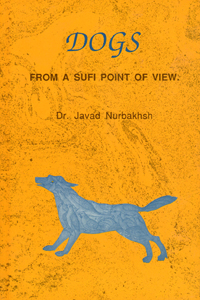



This book presents the image of the dog as portrayed in sufi literature, and it is illustrated with Persian miniatures. In contrast to the prevailing Islamic view of the dog as a foul, vicious and unclean animal, the sufis held the poverty and wretchedness of the dog in special esteem, considering themselves to be dogs -- or less than dogs -- in the lane of the Beloved. These stories communicate the value of humility, loyalty, and other praiseworthy qualities of the base animal nature of their own ego, and emphasize the value of training that tames wildness and makes even the dog useful to society.
Before embarking on discussion of the sufis’ attitude towards the dog and commenting on the dogs attributes, let me first introduce this text by quoting ‘Ali ebn Abi Taleb, the seminal figure of Sufism:
Happy is the one who leads the life of a dog! For the dog has ten characteristics which every believer should possess. First, the dog has no status among creatures; second, the dog is a pauper having no worldly goods; third, the entire earth is his resting place; fourth, the dog goes hungry most of the time; fifth, the dog will not leave his master’s door even after having received a hundred lashes; sixth, he protects his master and his friend, and when someone approaches he will attack the foe and let the friend pass; seventh, he guards his master by night, never sleeping; eight, he performs most of his duties silently; ninth, he is content with whatever his master gives him; and tenth, when he dies, he leaves no inheritance.
Elsewhere ‘Ali has said, “Amongst dogs, good is found only in the hunting and sheep dogs.”
Two conclusions may be draw from this second quotation. The first is that in Islam and Sufism, knowledge and training are so important that even a trained dog is considered a respected model, being of some value as opposed to an untrained dog which is regarded as having no value. The second is that the sufi master, when instructing people, utilizes this same idea to teach them that in addition to benefitting from the society in which they live, they must also serve and contribute to the well-being of that society. The idle individual is like a stray dog, worthless and unproductive, while the useful individual, like the dog that is beneficial to society, is valuable to that society and worthy of respect.
 Classical Persian Sufism from its Origins to Rumi (700-1300)
Classical Persian Sufism from its Origins to Rumi (700-1300)
 Jesus in the Eyes of the Sufis
Jesus in the Eyes of the Sufis
 Spiritual Poverty in Sufism
Spiritual Poverty in Sufism
 Sufi Women
Sufi Women
 The Great Satan 'Eblis'
The Great Satan 'Eblis'
 The Legacy of Mediaeval Persian Sufism
The Legacy of Mediaeval Persian Sufism